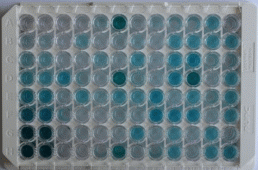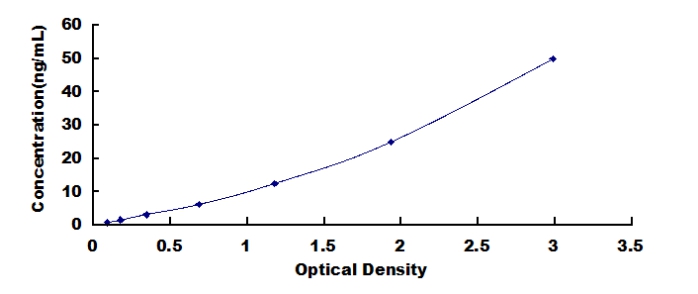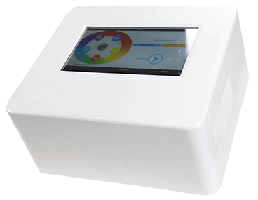Packages (Simulation)

Reagent Preparation

Image (I)
Image (II)
Certificate


ELISA Kit for Cathelicidin Antimicrobial Peptide (CAMP)
CAP18; FALL39; HSD26; LL37; 18 kDa Cationic Antimicrobial Protein; Antibacterial protein FALL-39; FALL-39 peptide antibiotic
- Product No.SEC419Hu
- Organism SpeciesHomo sapiens (Human) Same name, Different species.
- Sample Typeserum, plasma and other biological fluids
- Test MethodDouble-antibody Sandwich
- Assay Length3h
- Detection Range0.78-50ng/mL
- SensitivityThe minimum detectable dose of this kit is typically less than 0.27ng/mL.
- DownloadInstruction Manual
- UOM 48T96T 96T*5 96T*10 96T*100
- FOB
US$ 595
US$ 850
US$ 3825
US$ 7225
US$ 59500
For more details, please contact local distributors!
Specificity
This assay has high sensitivity and excellent specificity for detection of Cathelicidin Antimicrobial Peptide (CAMP).
No significant cross-reactivity or interference between Cathelicidin Antimicrobial Peptide (CAMP) and analogues was observed.
Recovery
Matrices listed below were spiked with certain level of recombinant Cathelicidin Antimicrobial Peptide (CAMP) and the recovery rates were calculated by comparing the measured value to the expected amount of Cathelicidin Antimicrobial Peptide (CAMP) in samples.
| Matrix | Recovery range (%) | Average(%) |
| serum(n=5) | 89-103 | 98 |
| EDTA plasma(n=5) | 95-103 | 99 |
| heparin plasma(n=5) | 79-92 | 88 |
Precision
Intra-assay Precision (Precision within an assay): 3 samples with low, middle and high level Cathelicidin Antimicrobial Peptide (CAMP) were tested 20 times on one plate, respectively.
Inter-assay Precision (Precision between assays): 3 samples with low, middle and high level Cathelicidin Antimicrobial Peptide (CAMP) were tested on 3 different plates, 8 replicates in each plate.
CV(%) = SD/meanX100
Intra-Assay: CV<10%
Inter-Assay: CV<12%
Linearity
The linearity of the kit was assayed by testing samples spiked with appropriate concentration of Cathelicidin Antimicrobial Peptide (CAMP) and their serial dilutions. The results were demonstrated by the percentage of calculated concentration to the expected.
| Sample | 1:2 | 1:4 | 1:8 | 1:16 |
| serum(n=5) | 78-92% | 88-95% | 96-103% | 91-101% |
| EDTA plasma(n=5) | 80-103% | 92-105% | 89-105% | 80-93% |
| heparin plasma(n=5) | 80-102% | 87-96% | 95-104% | 99-105% |
Stability
The stability of kit is determined by the loss rate of activity. The loss rate of this kit is less than 5% within the expiration date under appropriate storage condition.
To minimize extra influence on the performance, operation procedures and lab conditions, especially room temperature, air humidity, incubator temperature should be strictly controlled. It is also strongly suggested that the whole assay is performed by the same operator from the beginning to the end.
Reagents and materials provided
| Reagents | Quantity | Reagents | Quantity |
| Pre-coated, ready to use 96-well strip plate | 1 | Plate sealer for 96 wells | 4 |
| Standard | 2 | Standard Diluent | 1×20mL |
| Detection Reagent A | 1×120µL | Assay Diluent A | 1×12mL |
| Detection Reagent B | 1×120µL | Assay Diluent B | 1×12mL |
| TMB Substrate | 1×9mL | Stop Solution | 1×6mL |
| Wash Buffer (30 × concentrate) | 1×20mL | Instruction manual | 1 |
Assay procedure summary
1. Prepare all reagents, samples and standards;
2. Add 100µL standard or sample to each well. Incubate 1 hours at 37°C;
3. Aspirate and add 100µL prepared Detection Reagent A. Incubate 1 hour at 37°C;
4. Aspirate and wash 3 times;
5. Add 100µL prepared Detection Reagent B. Incubate 30 minutes at 37°C;
6. Aspirate and wash 5 times;
7. Add 90µL Substrate Solution. Incubate 10-20 minutes at 37°C;
8. Add 50µL Stop Solution. Read at 450nm immediately.
GIVEAWAYS
INCREMENT SERVICES
-
 Single-component Reagents of Assay Kit
Single-component Reagents of Assay Kit
-
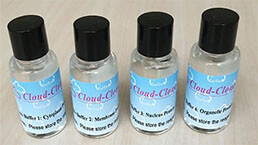 Lysis Buffer Specific for ELISA / CLIA
Lysis Buffer Specific for ELISA / CLIA
-
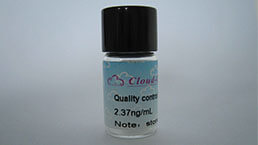 Quality Control of Kit
Quality Control of Kit
-
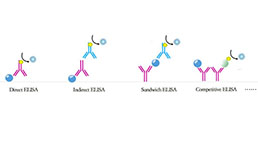 ELISA Kit Customized Service
ELISA Kit Customized Service
-
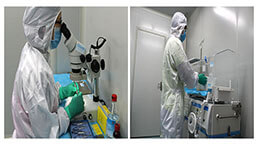 Disease Model Customized Service
Disease Model Customized Service
-
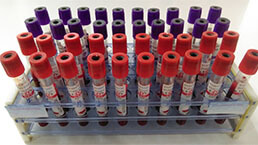 Serums Customized Service
Serums Customized Service
-
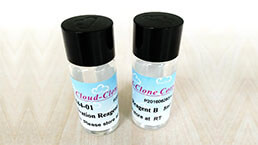 TGFB1 Activation Reagent
TGFB1 Activation Reagent
-
 Real Time PCR Experimental Service
Real Time PCR Experimental Service
-
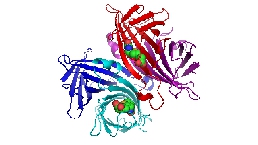 Streptavidin
Streptavidin
-
 Fast blue Protein Stain solution
Fast blue Protein Stain solution
-
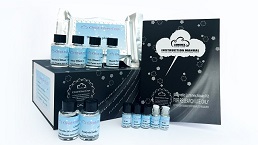 Single-component Reagents of FLIA Kit
Single-component Reagents of FLIA Kit
-
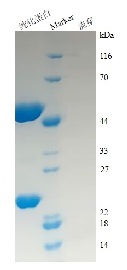 Streptavidin-Agarose Beads
Streptavidin-Agarose Beads
| Magazine | Citations |
| University of Waikato | The Assessment of Vitamin D, Antimicrobial Peptides and Procalcitonin in Bronchiectasis Waikato:Source |
| Clin Infect Dis. | Host immune response to tuberculous meningitis Pubmed:25301213 |
| Vaccine | On birth single dose live attenuated OPV and BCG vaccination induces gut cathelicidin LL37 responses at 6 week of age: A natural experiment Pubmed:25444792 |
| Urology | Modulating the Internalization of Bacille Calmette-Guérin by Cathelicidin in Bladder Cancer Cells Pubmed:25681250 |
| Urology | Modulating the Internalization of Bacille Calmette-Guérin by Cathelicidin in Bladder Cancer Cells PubMed: 25681250 |
| Sarcoidosis Vasc Diffuse Lung Dis | Cathelicidin as a link between sarcoidosis and tuberculosis PubMed: 26422567 |
| Allergy and Asthma Proceedings | The association of vitamin D, cathelicidin, and vitamin D binding protein with acute asthma attacks in children PubMed: 26108071 |
| J Clin Microbiol. | Swiftly Decreasing Cerebrospinal Fluid Cathelicidin Concentration Predicts Improved Outcome in Childhood Bacterial Meningitis. Pubmed:27008883 |
| experimental dermatology | Light-emitting diodes downregulate cathelicidin, kallikrein and toll-like receptor 2 expressions in keratinocytes and rosacea-like mouse skin. pubmed:27315464 |
| PLOS ONE | Reduced Expression of the Extracellular Calcium-Sensing Receptor (CaSR) Is Associated withActivation of the Renin-Angiotensin System (RAS) to Promote Vascular Remodeling in the Pathogenesis of Essential Hypertension. pubmed:27391973 |
| Front Pharmacol. | Ginsenoside Rg5 Inhibits Succinate-Associated Lipolysis in Adipose Tissue and Prevents Muscle Insulin Resistance. pubmed:28261091 |
| Allergologia et immunopathologia | The relation of innate and adaptive immunity with viral-induced acute asthma attacks: Focusing on IP-10 and cathelicidin pubmed:27955890 |
| Chinese Journal of Osteoporosis and Bone Mineral Research | Effects of cold exposure on the bone marrow adipose tissue DOI: 10.3969/j.issn.1674-2591.2017.05.008 |
| Scientific Reports | Measurements of AMPs in stratum corneum of atopic dermatitis and healthy skin–tape stripping technique Pubmed:29374283 |
| Experimental Parasitology | Antimalarial activity of vitamin D3 (VD3) does not result from VD3-induced antimicrobial agents including nitric oxide or cathelicidin Pubmed: 30904694 |
| Theranostics | Myeloid cell-derived LL-37 promotes lung cancer growth by activating Wnt/β-catenin signaling Pubmed: 31149039 |
| INTERNATIONAL JOURNAL OF MOLECULAR SCIENCES | Short-Term versus Long-Term Culture of A549 Cells for Evaluating the Effects of Lipopolysaccharide on Oxidative Stress, Surfactant Proteins and Cathelicidin LL-37 Pubmed: 32050475 |
| MICROB PATHOGENESIS | Hypovitaminosis D and reduced cathelicidin are strongly correlated during the multidrug therapy against leprosy Pubmed: 32645421 |
| International Journal of Nanomedicine | Effect of Lonicerae japonicae Flos Carbonisata-Derived Carbon Dots on Rat Models of Fever and Hypothermia Induced by Lipopolysaccharide Pubmed: 32606669 |
| 博士论文 | Relações causais entre a expressão dos genes do receptor de Vitamina D e do Peptídeo Antimicrobiano Catelicidina sobre marcadores sorológicos de pessoas com … |
| PLoS One | Beneficial impact of cathelicidin on hypersensitivity pneumonitis treatment¡ªIn vivo studies 33999928 |
| New Med | Analysis of the level of non-specific and specific immunity parameters in saliva of children with osteogenesis imperfecta and study of relationships between?¡ |
| Type I interferons link skin-associated dysbiotic commensal bacteria to pathogenic inflammation and angiogenesis in rosacea | |
| Int J Mol Sci | Compartmentalized Innate Immune Response of Human Fetal Membranes against Escherichia coli Choriodecidual Infection Pubmed:35328414 |
| Cell Rep | LL-37 transports immunoreactive cGAMP to activate STING signaling and enhance interferon-mediated host antiviral immunity Pubmed:35649354 |

